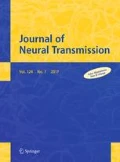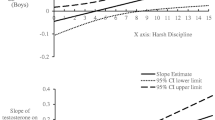Summary.
Various researchers distinguished two categories of aggressive behaviour, namely reactive and proactive aggression. Reactive aggression is an aggressive response to a perceived threat or provocation, whereas proactive aggression is behaviour that anticipates a reward. In the present study, including both a sample of disruptive behaviour disordered (DBD) and normal control (NC) children, we observed reactive and proactive aggressive behaviour during an experimental dyadic play session. DBD children showed more observed reactive and proactive aggression. Subsequently, we investigated whether the observed measures correlated with parent-rated measures of reactive and proactive aggression in. We distinguished in both NC and DBD children a subgroup showing a rise in cortisol level, i.e. responders, and a subgroup who did not show a rise in cortisol, i.e. non-responders. Results suggest that differences in the cortisol response affects the correspondence between observed and parent-rated reactive and proactive aggression since only DBD non-responders showed the expected correlations.
Similar content being viewed by others
References
TM Achenbach (1991) Manual for the Child Behaviour Checklist/4-18 and 1991 profile University of Vermont, Department of Psychiatry Burlington, Vermont
A Bandura (1973) Aggression: a social learning theory analysis Prentice-Hall New York
L Berkowitz (1983) The experience of anger as parallel process in the display of impulsive, “angry” aggression RG Green EI Donnerstein (Eds) Aggression: theoretical and empirical views Academic Press New York 103–134
M Boivin KA Dodge JD Coie (1995) ArticleTitleIndividual-group behavioural similarity and peer status in experimental playgroups of boys: the social misfit revisited J Pers Soc Psychol 69 269–279 Occurrence Handle7643305 Occurrence Handle10.1037/0022-3514.69.2.269 Occurrence Handle1:STN:280:DyaK2MzntFShug%3D%3D
K Brown MS Atkins ML Osborne M Milnamow (1996) ArticleTitleA revised teacher rating scale for reactive and proactive aggression J Abnorm Child Psychol 24 473–480 Occurrence Handle8886943 Occurrence Handle10.1007/BF01441569 Occurrence Handle1:STN:280:DyaK2s%2FktFKksA%3D%3D
BJ Bushman CA Anderson (2001) ArticleTitleIs it time to pull the plug on the hostile versus instrumental aggression dichotomy? Psychol Rev 108 273–279 Occurrence Handle11212630 Occurrence Handle10.1037/0033-295X.108.1.273 Occurrence Handle1:STN:280:DC%2BD3M7ktFOitA%3D%3D
JD Coie KA Dodge R Terry V Wright (1991) ArticleTitleThe role of aggression in peer relations: an analysis of aggression episodes in boys’ play groups Child Dev 62 812–826 Occurrence Handle1935345 Occurrence Handle10.2307/1131179 Occurrence Handle1:STN:280:DyaK38%2Fjs1Krug%3D%3D
NR Crick KA Dodge (1996) ArticleTitleSocial information-processing mechanisms in reactive and proactive aggression Child Dev 67 993–1002 Occurrence Handle8706540 Occurrence Handle10.2307/1131875 Occurrence Handle1:STN:280:DyaK28zhsVyhsA%3D%3D
KA Dodge (1991) The structure and function of reactive and proactive aggression in the development and treatment of childhood aggression DJ Pepler KH Rubin (Eds) The development and treatment of childhood aggression Erlbaum Hillsdale, NJ 201–218
KA Dodge JD Coie (1987) ArticleTitleSocial-information processing factors in reactive and proactive aggression in children’s peer groups J Pers Soc Psychol 53 1146–1158 Occurrence Handle3694454 Occurrence Handle10.1037/0022-3514.53.6.1146 Occurrence Handle1:STN:280:DyaL1c%2FptVCiuw%3D%3D
KA Dodge JE Lochman JD Harnish JE Bates GS Pettit (1997) ArticleTitleReactive and proactive aggression in school children and psychiatrically impaired chronically assaultive youth J Abnorm Psychol 106 37–51 Occurrence Handle9103716 Occurrence Handle10.1037/0021-843X.106.1.37 Occurrence Handle1:STN:280:DyaK2s3lslSntA%3D%3D
KA Dodge JM Price JD Coie C Christopoulos (1990) ArticleTitleOn the development of aggressive dyadic relationships in boy’s peer groups Hum Dev 33 260–270 Occurrence Handle10.1159/000276523
J Dollard CW Doob NE Miller OH Mowrer RR Sears (1939) Frustration and aggression Yale University Press New Haven, CT
H Grietens P Onghena P Prinzie E Gadeyne V Van Assche P Ghesquiere W Hellinckx (2004) ArticleTitleComparison of mothers’, fathers’, and teachers’ reports on problem behaviour in 5- to 6-year-old children J Psychopathol Behav Assess 26 137–146 Occurrence Handle10.1023/B:JOBA.0000013661.14995.59
J Haller J van der Schraaf MR Kruk (2001) ArticleTitleDeviant forms of aggression in glucocorticoid hyporeactive rats: a model for ‘pathological’ aggression? J Neuroendocrinol 13 102–107 Occurrence Handle11123520 Occurrence Handle10.1046/j.1365-2826.2001.00600.x Occurrence Handle1:CAS:528:DC%2BD3MXotVyrtw%3D%3D
M Kempes W Matthys H de Vries H van Engeland (2005) ArticleTitleReactive and proactive aggression in children: a review of theory, findings and the relevance for child and adolescent psychiatry Eur Child Adolesc Psychiatry 14 11–19 Occurrence Handle15756511 Occurrence Handle10.1007/s00787-005-0432-4
M Kempes W Matthys G Maassen S van Goozen H van Engeland (2006) ArticleTitleA parent questionnaire for distinguishing between reactive and proactive aggression in children Eur Child Adolesc Psychiatry 15 38–45 Occurrence Handle16514508 Occurrence Handle10.1007/s00787-006-0502-2
W Matthys P van Loo V Pachen H de Vries JA van Hooff H van Engeland (1995a) ArticleTitleBehaviour of conduct disordered children in interaction with each other and with normal peers Child Psychiatry Hum Dev 25 183–195 Occurrence Handle10.1007/BF02251302 Occurrence Handle1:STN:280:DyaK2M3lsVyqsA%3D%3D
W Matthys H De Vries A Hectors M Veerbeek W Heidemann M Goud JA Van Hooff H Van Engeland (1995b) ArticleTitleDifferences between conduct disordered and normal control children in their tendencies to escalate or neutralize conflicts when interacting with normal peers Child Psychiatry Hum Dev 26 29–41 Occurrence Handle10.1007/BF02353228 Occurrence Handle1:STN:280:DyaK28%2FksFyluw%3D%3D
W Matthys G Maassen JM Cuperus H van Engeland (2001) ArticleTitleThe assessment of the situational specificity of children’s problem behaviour in peer-peer context J Child Psychol Psychiatry 42 413–420 Occurrence Handle11321210 Occurrence Handle10.1017/S002196300100703X Occurrence Handle1:STN:280:DC%2BD3Mris1eltg%3D%3D
K McBurnett BB Lahey PJ Rathouz R Loeber (2000) ArticleTitleLow salivary cortisol and persistent aggression in boys referred for disruptive behaviour Arch Gen Psychiatry 57 38–43 Occurrence Handle10632231 Occurrence Handle10.1001/archpsyc.57.1.38 Occurrence Handle1:STN:280:DC%2BD3c%2Fps1SqsA%3D%3D
KE Moyer (1976) The psychobiology of aggression Harper and Row New York
F Poulin M Boivin (2000) ArticleTitleReactive and proactive aggression: evidence of a two-factor model Psychol Assess 12 115–122 Occurrence Handle10887757 Occurrence Handle10.1037/1040-3590.12.2.115 Occurrence Handle1:STN:280:DC%2BD3czksF2luw%3D%3D
JM Price KA Dodge (1989) ArticleTitleReactive and proactive aggression in childhood: relations to peer status and social context dimensions J Abnorm Child Psychol 17 455–471 Occurrence Handle2794257 Occurrence Handle10.1007/BF00915038 Occurrence Handle1:STN:280:DyaK3c%2FgvFOjsw%3D%3D
Sattler JM (1992) Assessment of children, 3rd rev. In: Sattler JM (ed). San Diego, CA
D Schwartz KA Dodge JD Coie JA Hubbard AH Cillessen EA Lemerise H Bateman (1998) ArticleTitleSocial-cognitive and behavioural correlates of aggression and victimization in boy’s playgroups Abnorm Child Psychol 26 431–440 Occurrence Handle10.1023/A:1022695601088 Occurrence Handle1:STN:280:DyaK1M7ht1ymtA%3D%3D
D Shaffer P Fisher CP Lucas MK Dulcan ME Schwab-Stone (2000) ArticleTitleThe NIMH diagnostic interview schedule for children version IV: Description, differences from previous versions and reliability of some common diagnosis J Am Acad Child Adolesc Psychiatry 29 28–38 Occurrence Handle10.1097/00004583-200001000-00014
Vandersteene G, Van Haasen PP, De Bruyn EEJ, Coestier P, Pijl YL, Poortinga UY, Lutje Spelberg HC, Speoleders-Claes R, Stinissen J (1986) WISC-R, Wechsler Intelligence Scale for children – revised. [Dutch version] Swets and Zeitlinger, Lisse
NM Van de Wiel SH van Goozen W Matthys H Snoek H van Engeland (2004) ArticleTitleCortisol and treatment effect in children with disruptive behaviour disorders: a preliminary study J Am Acad Child Adolesc Psychiatry 43 1011–1018 Occurrence Handle15266196 Occurrence Handle10.1097/01.chi.0000126976.56955.43
SH Van Goozen W Matthys PT Cohen-Kettenis C Gispen-de Wied VM Wiegant H van Engeland (1998) ArticleTitleSalivary cortisol and cardiovascular activity during stress in oppositional-defiant disorder boys and normal controls Biol Psychiatry 43 531–539 Occurrence Handle9547933 Occurrence Handle10.1016/S0006-3223(97)00253-9 Occurrence Handle1:CAS:528:DyaK1cXisVKmsL0%3D
SH Van Goozen W Matthys PT Cohen-Kettenis JK Buitelaar H van Engeland (2000) ArticleTitleHypothalamic-pituitary-adrenal axis and autonomic nervous system activity in disruptive children and matched controls J Am Acad Child Adolesc Psychiatry 39 1438–1445 Occurrence Handle11068900 Occurrence Handle10.1097/00004583-200011000-00019 Occurrence Handle1:STN:280:DC%2BD3crhtFKntw%3D%3D
MM Vanyukov HB Moss JA Plail T Blackson AC Mezzich RE Tarter (1993) ArticleTitleAntisocial symptoms in preadolescent boys and in their parents: Associations with cortisol Psychiatry Res 46 9–17 Occurrence Handle8464960 Occurrence Handle10.1016/0165-1781(93)90003-Y Occurrence Handle1:STN:280:DyaK3s3hvFCqtw%3D%3D
NJ Weinshenker A Siegel (2002) ArticleTitleBimodal classification of aggression: affective defense and predatory attack Aggress Violent Beh 7 237–250 Occurrence Handle10.1016/S1359-1789(01)00042-8
Author information
Authors and Affiliations
Corresponding author
Additional information
Correspondence: Maaike Kempes, Department of Child and Adolescent Psychiatry, Rudolf Magnus Institute of Neuroscience, University Medical Center Utrecht, Heidelberglaan 100, 3508GA, PB 85500, Hpnr.B01.324, Utrecht, The Netherlands
Rights and permissions
About this article
Cite this article
Kempes, M., de Vries, H., Matthys, W. et al. Differences in cortisol response affect the distinction of observed reactive and proactive aggression in children with aggressive behaviour disorders. J Neural Transm 115, 139–147 (2008). https://doi.org/10.1007/s00702-007-0810-9
Received:
Accepted:
Published:
Issue Date:
DOI: https://doi.org/10.1007/s00702-007-0810-9




